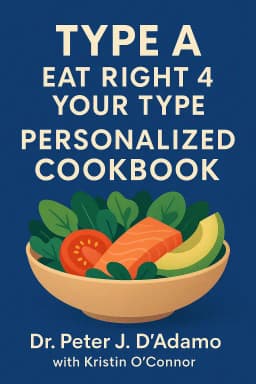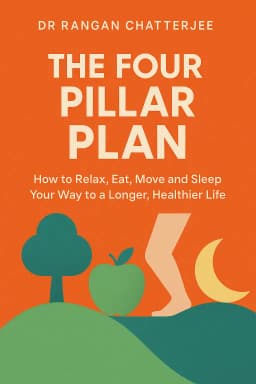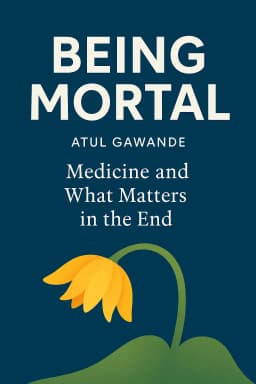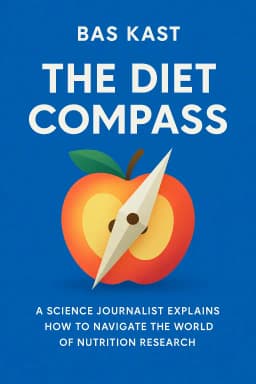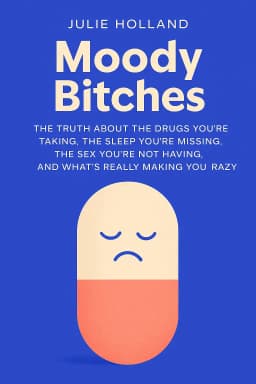
The Moody Bitch Manifesto
Golden Hook & Introduction
SECTION
Laura: One in four women in America is on psychiatric medication. And according to our book today, a huge number of them are being sold a solution that masks the problem, and might even be making things worse. The problem isn't their emotions; it's that they're being persuaded to medicate them away. Sophia: Wow, that is a bold opening statement. It feels like you’re about to light a cultural fuse. What book are we talking about? Laura: That's the explosive premise of Moody Bitches by Dr. Julie Holland. And the title is just the beginning. Sophia: And Dr. Holland isn't just anyone making these claims. I looked her up—she ran the psychiatric emergency room at Bellevue Hospital in New York for nine years. She’s seen it all. Laura: Exactly. She’s a psychopharmacologist who has been on the front lines. And she argues that this trend of over-medication is silencing a woman's most powerful tool: her intuition. The book got some polarizing reviews for this very reason, but it also inspired an HBO pilot produced by Oprah's company, so it clearly hit a major nerve. Sophia: Okay, Oprah and HBO. Now I'm really listening. So let's get into it. The title itself, Moody Bitches... that's a phrase usually thrown as an insult. Laura: It is, and that's precisely her point. The book's title is a reclamation. Holland’s first big idea is that we should embrace the label. She says, "We are moody bitches, and that is a strength—not a weakness."
The 'Moody Bitch' Manifesto: Reframing Moodiness as a Superpower
SECTION
Sophia: Hold on. My entire life, 'moody bitch' has been a criticism, something to be ashamed of or apologize for. How on earth is she framing that as a strength? Laura: She makes an evolutionary argument. She says that women's hormonal cycles create a natural dynamism. This sensitivity allows us to be incredibly responsive to our environment, our children, our partners. It imparts flexibility and adaptability. Being fixed, rigid, and emotionally flat doesn't actually lend itself to survival. Sophia: That’s a fascinating reframe. So our moods are like a built-in radar system, not a malfunction. Laura: Exactly. But she’s watched that perception completely change in her own practice. She tells this incredible story about her first twenty years as a psychiatrist. In the late 90s, women would come to her confused, saying, "I feel anxious, I feel sad, what's wrong with me?" She would spend most of the session just explaining what medication was and calming their fears about it. Sophia: Right, there was a stigma. Laura: A huge stigma. But then, direct-to-consumer advertising for drugs exploded. Suddenly, new patients were walking in asking for specific brands by name. They’d say, "I saw a commercial for Paxil, do you think that would work for my worry?" It got to the point where, by 2006, the antidepressant Zoloft was outselling Tide laundry detergent. Sophia: Zoloft was bigger than Tide? That’s an unbelievable statistic. It shows how normalized it became. Laura: It became the new normal. And Holland's critique is that drug companies spent billions turning normal human experiences—like sadness, fear, or grief—into medical diseases. She has this killer line: "They aren’t developing cures; they’re creating customers." Sophia: That's a huge claim, though. Is she saying that these medications are never necessary? Because for some people, they are life-saving. Laura: She's very clear about that. She's not anti-medication for severe, clinical depression or psychosis. Her target is the over-medicalization of what she calls "normal emotionality." She points to the fact that for a time, the top-selling medication in all of America—not just psych meds, all drugs—was Abilify. Sophia: Abilify? Isn't that an antipsychotic? Laura: Yes, originally formulated for schizophrenia. It was then marketed for depression. An antipsychotic became America's number one moneymaker. For Holland, this was a giant red flag that we've started treating everyday emotional turbulence with a sledgehammer.
The Chemical Puppet Masters: Hormones, The Pill, and Who You Love
SECTION
Sophia: Okay, so if the issue isn't a "chemical imbalance" that needs a pill to be fixed, what does Holland say is really going on? What's the engine driving these moods she says are so powerful? Laura: It comes down to our natural biological rhythms. She dedicates a huge part of the book to hormones and the menstrual cycle. She argues that PMS, for example, isn't just a week of being irritable. She calls it a "gift." Sophia: A gift? My PMS has never, ever felt like a gift. It feels like a week-long hostage situation where I'm both the hostage and the kidnapper. Laura: I hear you! But her point is that the premenstrual phase, when estrogen drops and we're more irritable and critical, is when our tolerance for nonsense is at its lowest. It’s the time of the month when we see the truth of our lives most clearly. The things that bother you during PMS are probably things you should be addressing the rest of the month. Your "bitchiness" is actually a bullshit detector. Sophia: My bullshit detector is definitely working overtime that week. But what about the Pill? Millions of women take oral contraceptives specifically to "regulate" their hormones and avoid that PMS rollercoaster. Is that a good thing, according to Holland? Laura: This is where it gets really interesting, and a little scary. She argues that the Pill, by design, flattens those natural hormonal peaks and valleys. It creates a steady, artificial hormonal state, essentially mimicking pregnancy. But in doing so, it might be disrupting something incredibly fundamental: who we're attracted to. Sophia: What do you mean? Laura: She brings up the famous "sweaty T-shirt experiment." The basic finding is that, when ovulating, women are unconsciously attracted to the scent of men who are genetically different from them. It's nature's way of ensuring genetic diversity and healthy offspring. Sophia: Right, the whole opposites attract thing, but on a biological level. Laura: Precisely. But studies have shown that women on the Pill lose this preference. Because the Pill chemically mimics pregnancy, their bodies are no longer looking for a genetically diverse "cad" to mate with. Instead, they start preferring the scent of men who are genetically similar to them—more like a brother or a father figure. A safe "dad." Sophia: Wait. Are you telling me the Pill could make me choose the wrong life partner? That I might be attracted to someone on the Pill that I wouldn't be attracted to off of it? That is terrifying! Laura: It's a shocking thought, isn't it? And it's at the core of Holland's argument. We are fundamentally altering our biology with these medications, often without any discussion of these profound potential side effects.
The Real Prescription: The Body's Own Medicine Cabinet
SECTION
Laura: And that's Holland's whole point. We're altering our fundamental biology without understanding the consequences. So her "survival guide" is about getting back in sync with our bodies, not suppressing them. Sophia: So what's the 'real prescription' then? If not a pill, what do we do when we feel overwhelmed, anxious, or depressed? Laura: Her prescription is a lifestyle overhaul, focusing on what she calls the body's own medicine cabinet. She has three main pillars. First, food as medicine. She argues that inflammation is a key driver of depression and anxiety. So an anti-inflammatory diet—avoiding sugar, processed foods, and focusing on whole foods—is a primary intervention. She talks about the gut-brain axis, how most of our serotonin is made in our gut, and how "carbs beget carbs," creating a cycle of blood sugar spikes and crashes that destabilize our mood. Sophia: That makes sense. The "hangry" feeling is very real. What's the second pillar? Laura: Sleep as a superpower. She says Americans are profoundly sleep-deprived, and women are hit hardest. Lack of sleep completely messes with our hunger hormones, leptin and ghrelin, making us crave carbs and gain weight. And it's devastating for our immune system. She cites a study showing that if you sleep less than seven hours a night, you're three times more likely to get sick with a cold. Sophia: Three times! Okay, I'm going to bed earlier tonight. And the third pillar? Laura: Exercise as a mood-booster. And not just because of endorphins. She talks about how exercise induces a state of "transient hypofrontality." It's a fancy term for what happens when blood flow shifts away from the prefrontal cortex—the part of your brain that worries and plans—and towards the sensory parts. It's that "flow state" where you get out of your head. It also activates the body's own endocannabinoid system, which is a natural anti-anxiety and anti-inflammatory agent. Sophia: So basically, instead of a one-size-fits-all pill, the prescription is highly personalized: listen to your body, feed it right, let it rest, and move it. It sounds so simple on paper, but so hard to do in modern life. Laura: It is. But her point is that these are the levers we actually have control over, and they are incredibly powerful.
Synthesis & Takeaways
SECTION
Laura: And that's the revolutionary, and for some, controversial, heart of Moody Bitches. It's not about rejecting medicine entirely, but about questioning a culture that tells women their natural, cyclical state is a disease that needs to be fixed or flattened. Holland's argument is that our bodies have an innate wisdom, if we just learn to listen to them. Sophia: It really reframes everything. Instead of asking "What's wrong with me?", the question becomes "What is my body trying to tell me?". That feels so much more empowering. It makes me want to actually track my own cycles and pay attention to what those PMS "gifts" might be revealing. Laura: Exactly. So for our listeners, the question we'll leave you with is this: What if your 'moodiness' isn't a flaw, but a finely-tuned feedback system? What might it be telling you? Sophia: A powerful thought to end on. Laura: This is Aibrary, signing off.
